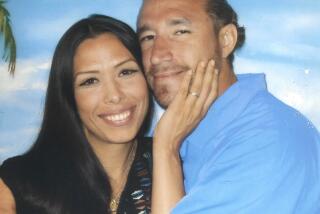Court says family can’t sue federal doctors over detainee’s death
- Share via
Reporting from Washington — The family of a Los Angeles-area immigrant who languished in federal detention for nearly a year while a cancerous growth went untreated cannot sue government doctors for medical neglect, the Supreme Court ruled Monday.
The case of Francisco Castaneda had been called shocking and “beyond cruel and unusual punishment” by a judge in Los Angeles.
But in a 9-0 opinion written by Justice Sonia Sotomayor, the high court said federal law prohibited suits against the employees of the Public Health Service, which provides medical care at immigration facilities and at some federal prisons.
A refugee from El Salvador who came to Los Angeles with his mother when he was 10, Castaneda was convicted of a drug charge in his early 30s. He was briefly held in a state prison and then transferred to the federal San Diego Correctional Facility pending his deportation.
Over 11 months, he repeatedly complained to doctors and a physician’s assistant that he had a growing lesion on his penis that he believed was cancerous. They refused to order a biopsy and told him, according to a report in his files, that he needed “to be patient and to wait.”
Castaneda was given ibuprofen and an extra set of boxer shorts because the growth was bleeding. Three outside specialists recommended a biopsy, but Dr. Esther Hui, his treating physician, refused.
Castaneda filed a grievance saying he was in great pain and “in desperate need of medical attention.”
In January 2007, another specialist recommended a biopsy, but instead, Immigration and Customs Enforcement officials ordered Castaneda released, sparing the agency the cost of treating him.
Three days later, he went to a hospital where he was diagnosed with cancer. His penis was amputated, but it was too late; the cancer had spread. He died at his Los Angeles home in February 2008.
Before his death, Castaneda testified before a House subcommittee that was investigating poor medical care given to immigrants held in federal custody. He also filed a broad lawsuit against the U.S. government, California’s prison system and Hui, and a physician’s assistant at the Public Health Service who denied him treatment. His sister and his daughter continued the suit after his death.
Two years ago, U.S. District Judge Dean Pregerson in Los Angeles called the case “one of the most, if not the most egregious” violations of a detainee’s constitutional rights that he “had ever encountered.” The U.S. 9th Circuit Court of Appeals, in a 3-0 decision, agreed last year and said Public Health Service employees could be sued for ignoring a desperate prisoner’s need for medical care.
But the Supreme Court disagreed, saying that Congress had specifically prohibited suits against Public Health Service employees. Sotomayor said the law governing the Public Health Service says a damage suit against the government itself is the “exclusive” remedy for victims of medical errors or negligence.
“We are mindful of the confines of our judicial role,” Sotomayor said in Hui vs. Castaneda. There may be good arguments for allowing sympathetic plaintiffs to sue over egregious conduct, she said, but “we are required, however, to read the statute according to its text.”
Sotomayor noted that the federal government had admitted liability for “medical negligence” in Castaneda’s case.
Gabriel Eber, staff attorney with the American Civil Liberties Union’s National Prison Project, said, “Today’s ruling is a disappointment and yet another missed opportunity to bring about the meaningful reforms that our nation’s immigration detention system desperately needs.”
Arthur Bryant, executive director of Public Justice in Oakland, who represented Castaneda’s family, said they would press forward with their claims against the government.
“We are, of course, disappointed,” Bryant said. “But this is far from over.”
More to Read
Sign up for Essential California
The most important California stories and recommendations in your inbox every morning.
You may occasionally receive promotional content from the Los Angeles Times.














